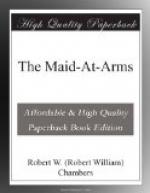Rumors were flying thick, every settlement had its full covey; every cross-road tavern buzzed with gossip. As we travelled from settlement to settlement, we, too, heard something of what had happened in distant districts: how the Schoharie militia had been called out; how one Huetson had been captured as he was gathering a band of Tories to join the Butlers; how a certain Captain Ball had raised a company of sixty-three royalists at Beaverdam and was fled to join Sir John; how Captain George Mann, of the militia, refused service, declaring himself a royalist, and disbanding his company; how Adam Crysler had thrown his important influence in favor of the King, and that the inhabitants of Tryon County were gloomy and depressed, seeing so many respectable gentlemen siding with the Tories.
We learned that the Schoharie and Schenectady militia had refused to march unless some provision was made to protect their families in their absence; that Congress had therefore established a corps of invalids, consisting of eight companies, each to have one captain, two lieutenants, two ensigns, five sergeants, six corporals, two drums, two fifes, and one hundred men; one company to be stationed in Schoharie, and to be called the “Associate Exempts”; that three forts for the protection of the Schoharie Valley were nearly finished, called the Upper, Lower, and Middle forts.
More sinister still were the rumors from the British armies: Burgoyne was marching on Albany from the north with the finest train of artillery ever seen in America; St. Leger was moving from the west; McDonald had started already, flinging out his Indian scouts as far as Perth and Broadalbin, and Sir Henry Clinton had gathered a great army at New York and was preparing to sweep the Hudson Valley from Fishkill to Albany. And the focus of these three armies and of Butler’s, Johnson’s, and McDonald’s renegades and Indians was this unhappy county of Tryon, torn already with internal dissensions; unarmed, unprovisioned, unorganized, almost ungarrisoned.
I remember, one rainy day towards sunset, coming into a small hamlet where, in front of the church, some score of farmers and yokels were gathered, marshalled into a single line. Some were armed with rifles, some with blunderbusses, some with spears and hay-forks. None wore uniform. As we halted to watch the pathetic array, their fifer and drummer wheeled out and marched down the line, playing Yankee Doodle. Then the minister laid down his blunderbuss and, facing the company, raised his arms in prayer, invoking the “God of Armies” as though he addressed his supplication before a vast armed host.
Murphy strove to laugh, but failed; Mount muttered vaguely under his breath; Elerson gnawed his lips and bent his bared head while the old man finished his prayer to “The God of Armies!” then picked up his blunderbuss and limped to his place in the scanty file.




